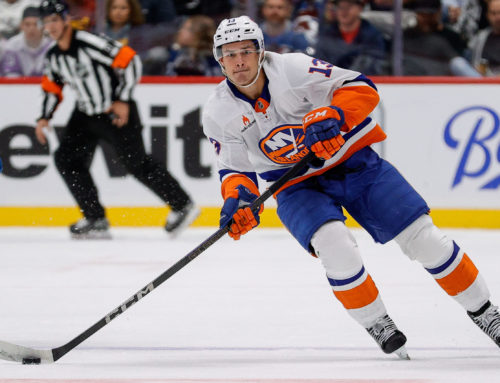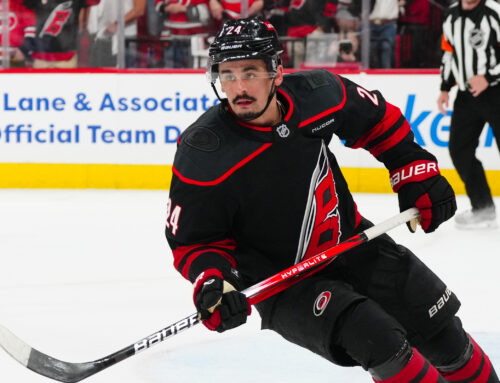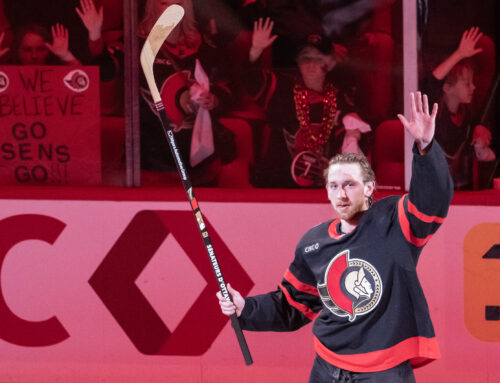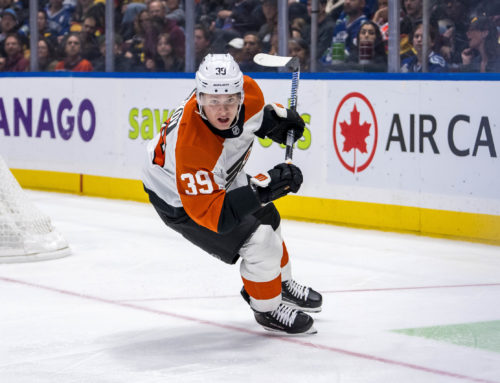In this week's Eastern Edge, we'll look at a few players off to disappointing starts and discuss their potential to bounce back.
The 24-year-old defenseman is off to a slow start this year with just six assists through 16 appearances. The lack of production isn't due to a lack of opportunity as Chabot leads the league in ice time, averaging 27 and a half minutes per game. It seems he's being deployed in more of an offensive role this year, starting 58% of his shifts in the attacking zone – up from last year's 42%. He's also seeing a prominent role with the man advantage, enjoying a 69% share of the Senators' total power play time. Nice! In recent years, you may have shied away from Chabot because his offensive potential was limited by Ottawa's lacklustre roster. However, the team's young guns – headlined by Drake Batherson and Brady Tkachuk – have displayed great offensive ability this year. As the team around him continues to develop and improve, Chabot should have an easier time finding the scoresheet. He's a talented player, who gets a high volume of opportunity, surrounded by an underrated supporting cast. I'm confident his offensive output will improve as the season progresses.
The start of the 2020-21 campaign was one to forget for Taylor Hall. He began the year in Buffalo and posted just 19 points in 37 games with the Sabres. Fortunately, a midseason trade to the Bruins catalyzed a resurgence and he closed out the year with 14 points in his last 16 games. As a result of that late season bounce back, Hall's lack of production in Buffalo was seen as more of an outlier than a sign of a player on the decline. As such, his fantasy value heading into this season was relatively unaffected by last year's disappointing 51-point pace. Fast forward to the present and Hall is sitting with just nine points through 15 outings, which translates to 49 points over 82 games. In other words, his current pace is more similar to last year's disappointing output than it is to previous years of success.
While I think Hall has the talent to be more productive, there are a couple of factors which suggest that things won't improve much going forward. For starters, he's spent most of the season beside Charlie Coyle, who doesn't possess the same offensive ability and playmaking prowess that David Krejci showed last season. With Krejci playing in the Czech Republic this year, Hall will continue to be limited by his linemates unless the Bruins acquire a second-line center through trade. More importantly though, Hall's production is limited by a lack of opportunity. He's seeing just 15 and a half minutes of ice time per game this season – the lowest average of his career. While he began the season with a prominent power-play role, that seems to have changed in the last four games, in which he's seen less than a third of Boston's total time with the man advantage. Although I'm optimistic about the player himself, I'm pessimistic about his situation. Unless the situation changes dramatically, I don't think Hall can be a 65-point player this year.
The 24-year-old center is off to a slow start this year with just eight points in his first 15 appearances. Although expectations are high for him as the team's most offensively gifted player, it's hard to single him out given New York's overall scoring struggles. As I write this, only the Coyotes have scored fewer goals per game (1.79) than the Islanders (2.07). Perhaps the team is feeling the effects of last year's playoff run, which went on until late-June and left them with a shorter offseason relative to most teams. They also started the season on a tough 13-game road trip, so things may start to improve now that they finally have a chance to find their bearings at home, in a beautiful new arena. I'm not too worried about Barzal's offensive output because he's consistently paced for 60-plus points despite playing under the defensively focused system of coach Barry Trotz. I don't see anything too concerning in his numbers which would suggest a massive drop in production this year. Sure, he's averaging 17 minutes and a half minutes of ice time this year, which is down from last year's average of 18:45, but we've seen plenty of players produce at a high level while skating similar minutes. Barzal saw less than 18 minutes a night during his rookie season and still managed 85 points, so his current deployment isn't cause for concern. With all that being said, it's worth noting that Jordan Eberle – a frequent linemate of Barzal's in recent years – was selected by Seattle during their expansion draft. Although Barzal certainly has the talent to create his own offense, Eberle had a strong ability to drive play and his absence may have a bigger impact on Barzal than we had originally anticipated.
The Lightning forward saw his fantasy value skyrocket after he paced for 69 points last season. His impressive pace was fueled by strong production on the man advantage as he posted 20 power-play points in 55 games. That increased output was a product of increased opportunity as Palat saw 64% of Tampa's total PP time last year – an uncharacteristically high proportion due to Nikita Kucherov's season-long absence. Although Kucherov has also been sidelined for the majority of this season, Palat isn't seeing as much time with the man advantage, holding just a 45% share of the team's total PP time. Through 17 appearances this year, he has just one point on the power play. Kucherov is expected to return in another four to six weeks and I can only see Palat's PP role decreasing once the Russian superstar gets back in the lineup. With this in mind, I think Palat's current 50-point pace is more indicative of what we should expect this year, rather than the near-70-point rate he posted last year.





 BUF
BUF NYR
NYR CHI
CHI WSH
WSH CBJ
CBJ S.J
S.J VAN
VAN ANA
ANA
